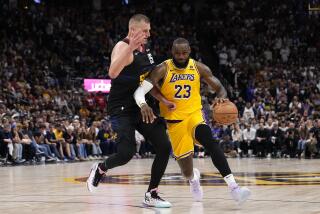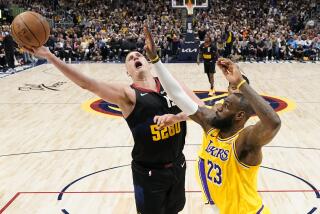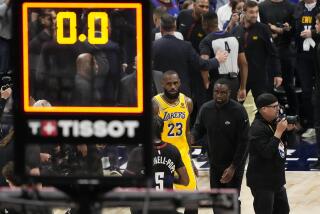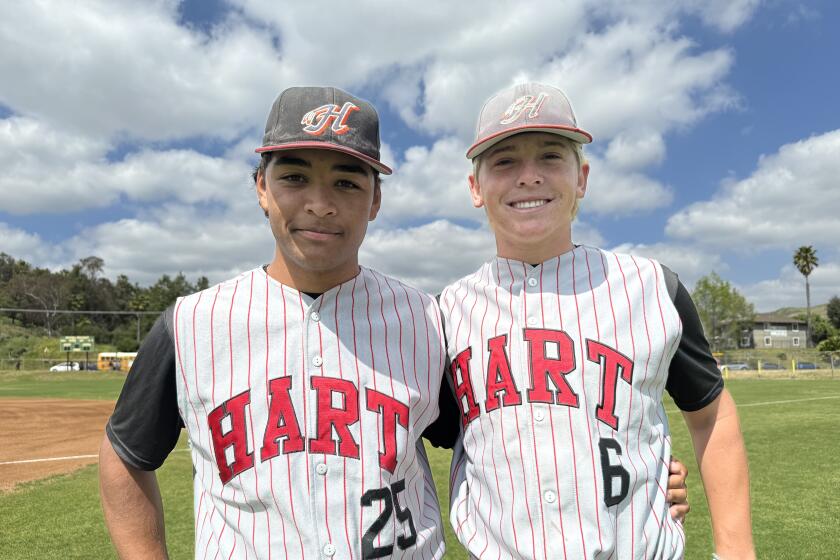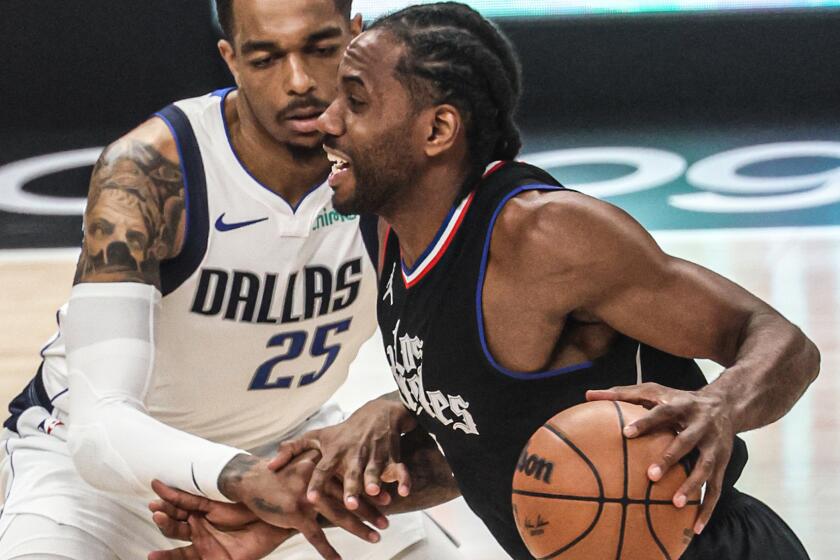The book on Manny: He loves L.A.! Boston? Not so much
On the day Manny left Boston, the [Boston] Globe posted a chart with his career numbers . . .: .312 average, .409 OBP, and 510 homers. Next to it was the headline: “Manny Deal Was Necessary.”
On many levels, Manny’s song never played well in the Boston market. Exasperation surfaced with every trade request, lack of hustle, injury, or gaffe. Red Sox teammate [Kevin] Millar once summed him up [to] the Globe: “He’s got a good heart, a heart of gold. But there’s also a gap there and he does things that [tick] people off. I don’t know why he does it.”
He does it, perhaps, because he lives in the moment, neither suffering regret nor calculating the consequences of his next move. Although his production rarely wavered in Boston, his comfort level did. The team morphed to reflect upper management’s preference for low-maintenance professionals. Outliers -- [Johnny] Damon, [Pedro] Martinez, [Derek] Lowe, Millar, [Julian] Tavarez -- were weeded out. In their absence, Manny felt isolated. He remained close to [David] Ortiz and [Julio] Lugo, but never felt the same. At least that’s how his mentor, [high school coach Carlos] Macaco [Ferreira], sees it. “Pedro, David, and Manny were like three legs of a stool,” he says. “When Pedro left, things grew unstable.”
Martinez agrees. “He was comfortable in Boston for a time. I was his closest friend. But once I left the team, things didn’t seem to be the same. It wasn’t the same group of guys, the same feeling, and that influenced Manny a lot.”
None of which excuses Manny’s meltdown in 2008.
Still, he had reasons for his frustration. He had never come to grips with the intensity of the Red Sox fans. “I’ve got people waiting for me at 3:00 a.m. in my hallway,” he complains. Trade discussions had arisen in four of the previous six years, but Manny and the Red Sox owners had never come to loggerheads. In anticipation of contract negotiations, Manny replaced [his agents] with the notoriously tough [Scott] Boras. The Red Sox, buoyed by two championships, felt able to get him off the payroll without fan backlash . . .
Aware that his time with the team -- and his teammates -- was coming to an end, Manny was hard pressed to give his best to a team he knew was eager to cast him aside. He took 5.7 seconds to reach first on a hit in a game against the Angels and opted out of a Mariners game. In the coup de grace, he took himself out of the posted lineup against the Yankees.
Still, he seemed surprised by the backlash. On the Sunday before the trade, with his mother cooking in the kitchen and Macaco beside him, he sulked in his Boston penthouse apartment, gently tossing a soft baseball to Manny Jr. He had done his best to ignore the headlines, despite his mother’s insistence on laying out the Boston papers each morning.
Glancing away, he explained: “I’m private and I don’t let nobody penetrate my space. I go play the game, go home, that’s it. I don’t read about what people are writing about me, that’s not my style.” He expressed feelings of betrayal by teammates who, in recent days, had distanced themselves from him. “When you’ve got a job in baseball, everybody’s trying to cover their [backside], you know. You’re working for them. They’re the ones that are sending out the checks. You’re not going to put your hands in the fire for me. So you got to be careful who you trust. That’s why I don’t trust nobody. I go, play the game, and move on.”
Is it possible that Boras’s view influenced Manny into feeling mistreated by his teammates, unappreciated by management, and nervous about his financial future? No one but Manny knows.
But [Boston third baseman Mike] Lowell has his hunches. “You know,” he reflects, “guys go through a lot of things in a season and not all of it is on the field. A lot of times you can correlate bad patches with someone being sick or some family issue. And some of that gets lost in, you know, SportsCenter. I think the contract situation was something that was weighing heavy on his mind. I can’t say how justified it is -- for me, if his contract says they have the option, then they have the option -- but it was weighing on him.” Lowell and others have suggested that Boras’s attitude may have sparked and then fanned the flames of Manny’s anxiety.
Of course, Red Sox management did little to tamp out the problems, and may have added fuel to the fire. Manny’s behavior had become reproachable, but hardly a radical departure from his ways of the past. This time, however, management seemed determined to use whatever means it had, including the local media, to sway opinion against him. On July 31, just one minute before the trade deadline, the Red Sox sent Manny to the Dodgers, agreeing to cover the remaining $7 million on his 2008 contract. Manny agreed to waive his no-trade clause and the Red Sox agreed to drop the two option years from his contract, rendering him a free agent in the fall. As part of the deal, the Sox surrendered two prospects and landed Jason Bay from the Pittsburgh Pirates, a solid player with an un-Manny-like persona in every way.
In the days following Manny’s departure, management and the Boston media seemed bent on justifying the trade. As if he had just uncovered the next Watergate, Globe columnist Dan Shaughnessy broke the news that [baseball Commissioner Bud] Selig had ordered an investigation into “the circumstances of Manny’s final hours with the Red Sox,” insinuating that Manny had forced the trade by “withholding services and playing at half-speed.” Manny’s production in July -- a .347 average and 1.060 OPS -- suggested otherwise, even if his reprehensible shove of [the team’s veteran traveling secretary] and lack of hustle did not.
Manny and Los Angeles fell for each other like teenage lovers. He was enchanted by the city, especially its malls, but also its warm weather and the laid-back, multicultural fan base. Accustomed to celebrities, and hardly as die-hard about their jocks as Bostonians, Southern Californians granted him relative privacy when he left the park.
Manny rewarded Dodgers fans with gaudy numbers and a division title. In his fifty-three regular-season games with the team, Manny hit 17 homers and [had] 53 RBIs, scoring 36 runs. He batted .396 and slugged .743, with a .489 on-base percentage. Dodgers fans, known for arriving fashionably late to ball games, suddenly couldn’t miss the first inning. That would mean missing one of Manny’s at-bats.
Attendance grew an average of [4,300] over the remainder of the regular season. Chants of “Maa-neey! Maa-neey!” filled Dodger Stadium. Little boys and grandmas alike slipped on dreadlock wigs -- and they kept wearing them even after Manny trimmed his hair to shoulder-length. Dodger Stadium came alive.
And Manny embraced the attention at the ballpark. The night the Dodgers clinched the National League West title, Manny, drenched in champagne and red Gatorade, walked onto the diamond and addressed the adoring crowd: “Hey, what’s up, L.A.?” he said. “Mannywood!”
The clubhouse underwent a transformation too. The stiffness of a team trying too hard to meet expectations dissolved when Manny, on only his second day with the team, turned up the volume dial on his speaker-connected iPod, disregarding a rule prohibiting music in the clubhouse. Younger players began feeling more at ease. They walked around the clubhouse bobbing their heads and singing favorite Manny tunes. Some wore T-shirts that said “We love Manny being Manny.” In more serious moments, they turned to Manny for advice on his approach to the game.
Manny had tried to mentor younger Boston players on occasion. “Manny helped me develop as a player here,” says [Jacoby] Ellsbury. When [Dustin] Pedroia earned Rookie of the Year honors for 2007, Manny bought him a Rolex watch and attached a congratulatory note. Manny had also bought the diminutive scrapper designer suits during his rookie season, just as older players had given him gifts when he was with Cleveland. But in Los Angeles, Manny seemed to, perhaps for the first time in his career, embrace the role of leader, even if in his quirky way. Players tried to emulate him, and felt awe watching him swing the bat.
“He’s pretty much the most unbelievable thing I’ve ever seen on a baseball field,” young Dodgers pitcher Clayton Kershaw told the New York Times.
--
Copyright Copyright 2009 by Jean Rhodes and Shawn Boburg. From the forthcoming book BECOMING MANNY by Jean Rhodes and Shawn Boburg to be published by Scribner, an Imprint of Simon & Schuster, Inc. Printed by permission.
More to Read
Get our high school sports newsletter
Prep Rally is devoted to the SoCal high school sports experience, bringing you scores, stories and a behind-the-scenes look at what makes prep sports so popular.
You may occasionally receive promotional content from the Los Angeles Times.
